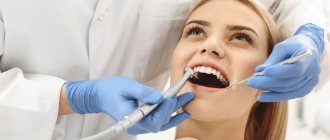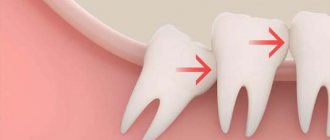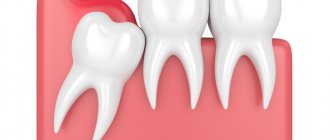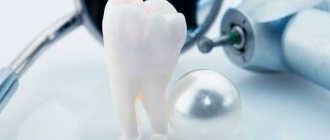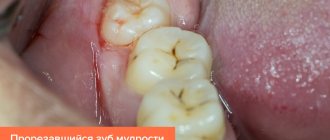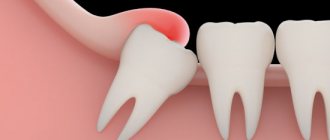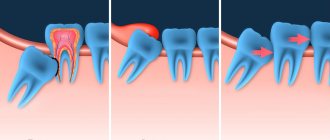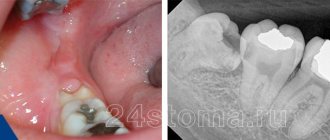While expecting a child, the body of the expectant mother undergoes various changes associated with the restructuring of all organs and systems. Which must now ensure the vital functions of both the female body and the development of the unborn child. For this reason, a woman’s metabolism may change, a lack of microelements and vitamins in the body may be detected, etc. Very often this is reflected in the condition of the teeth, since a growing fetus requires a lot of calcium for its formation. Therefore, doctors strongly recommend taking care of your teeth during pregnancy to prevent their damage and loss in the future.
The more attention a wisdom tooth requires during pregnancy. Since “eights”, due to their characteristics, can cause a lot of inconvenience to any person, and when carrying a child this can become especially problematic.
Extraction during pregnancy: pros and cons
The rapid eruption of the third molar in pregnant women is facilitated by hormonal levels, which enhance blood flow and activate metabolic processes in the body.
Pain during the eruption of the third molar can be severe, because during pregnancy:
- irritability of the nervous system increases;
- gums become swollen and inflamed;
- Due to vomiting in the first trimester, gastric juice damages the oral mucosa.
From the article on the website Stom-Firms.ru you will find out whether it is possible to remove a wisdom tooth during pregnancy, what complications there may be, and how to relieve toothache.
Pulpitis in pregnant women
A pregnant woman's teeth are especially susceptible to the negative effects of pathogenic bacteria. This contributes to the more frequent development of caries and pulpitis. There are several reasons why a pregnant woman's teeth are more susceptible to disease:
- The development of pulpitis is promoted by saliva, the composition of which is influenced by changes in hormonal levels.
- Contact with enamel of vomit during toxicosis. They have a low level of acidity, which leads to thinning of tooth enamel.
- Supplying gums with plenty of blood. The gums become loose and susceptible to the negative influence of bacteria. As a result of inflammation, caries appears, developing into pulpitis.
- A large amount of calcium is required for normal fetal development. The lack of this element in the body of the expectant mother leads to tooth decay.
If pain occurs, you should consult a specialist. The method of treating the disease is determined by the dentist. Delaying treatment can lead to complications and the development of other diseases.
When is a wisdom tooth removed during pregnancy?
Since X-rays are contraindicated for pregnant women, the condition of the third molar is assessed using a radiovisiograph. The device gently irradiates the patient and converts the X-ray signal into a digital image.
If the “eight” grows vertically and there is enough space in the jaw for it, the dentist cuts the gum “hood” and facilitates eruption.
Removal during pregnancy is indicated when:
- It grows incorrectly;
- Compresses the roots of the adjacent molar;
- Provokes severe pain;
- Causes pulpitis and periostitis.
The period from 15 to 22 weeks is suitable for figure eight extraction. At this stage, the process of laying the fetal organs is completed, and the activity of the placenta is maximum - it does not allow the drugs that the dentist uses for pain relief and local treatment to pass through. In case of purulent inflammation, emergency surgery is performed in any trimester, because the infection can penetrate the placenta and affect the fetus.
In pregnant women, the dentist uses lidocaine, articaine and mepivacaine as anesthesia. The choice of drug depends on the timing and individual sensitivity of the patient. In order not to administer a large dose, to increase the time of pain relief and to prevent bleeding, the anesthetic is diluted with a vasoconstrictor. It is not advisable to use it at 1, 2 and 9 months of gestation, as it can cause uterine spasms, disrupt intestinal function and increase blood pressure.
Tooth extraction during pregnancy: anesthesia and medications
Anesthesia is required for surgery. General anesthesia is not acceptable. Anesthesia with lidocaine and similar anesthetics with adrenaline is also not carried out for pregnant women. The drugs can cause cramps, muscle weakness, severe allergic reactions, and lower blood pressure.
Modern painkillers contain a minimum of adrenaline and do not contain vasoconstrictor components that cause uterine hypertonicity. When applied topically, they are practically not absorbed into the blood, therefore they are safe for the fetus.
Among the acceptable medications, the safest ones can be identified:
- Ultracaine;
- Alfacaine;
- Artifrin;
- Primacaine;
- Ubistezin.
During forced surgery, you do not have to endure pain, as happened several decades ago. Today, extraction is done absolutely painlessly.
If gum tissue is cut during surgery, antibiotic therapy is necessary. Pregnant women are usually prescribed Amoxiclav, which has an antibacterial and bactericidal effect. To reduce fever, a minimum dosage of Paracetamol may be prescribed.
Chlorhexidine, Miramistin, Romazulan - safe antiseptics - are used for mouth rinsing.
How to numb a wisdom tooth during pregnancy
You need to ensure that infection does not penetrate the gums: brush your teeth thoroughly and try not to chew on the side of the growing “eight”. To avoid damaging your gums, you should avoid rough foods and spices. You cannot use folk remedies for treatment, since many herbs are contraindicated for pregnant women. You should absolutely not rinse your mouth with alcohol solutions or place garlic on your gums. They irritate the mucous membrane, cause burns and increase pain.
If your dentist delays wisdom tooth removal until the second trimester, pain can be relieved in the following ways:
- Avoid very hot and very cold drinks and food;
- Rinse the mouth with warm saline solution;
- Take baths with chamomile infusion, soda or chlorhexidine solution;
- Apply a cold compress to your cheek for 15-20 minutes.
Dentists do not recommend using painkillers until the 12th week of pregnancy, when the placenta is still forming and medications can disrupt the development of fetal organs. But if the "eight" causes severe pain, the doctor may prescribe solutions or sprays with benzocaine or anti-inflammatory tablets by mouth.
The G8 is worried: what to do?
The wisdom tooth does not always make itself felt, but if it grows and causes pain, you need to consult a dentist. Since only the doctor will determine how critical the situation is, whether serious treatment or tooth extraction is necessary.
These symptoms indicate problems with the G8:
- The gums in the area of the wisdom tooth hurt and swell.
- The “eight” is knocked out of the dentition, climbs onto a neighboring tooth, and injures the gums or tongue.
- An already erupted wisdom tooth has the beginnings of caries and causes pain.
If you have such signs, you should consult a doctor. Pregnancy is not a contraindication, since modern dental treatment methods take into account the condition of the woman’s body during the period of bearing a child.
Complications after wisdom tooth removal in pregnant women
Pregnant women try not to remove the “eights”, since after the operation alveolitis often develops - infection of the bone socket. Due to the restructuring of the immune system, the mucous membrane has difficulty resisting bacteria; they easily penetrate the postoperative wound and periosteum, causing periostitis. At the same time, the body temperature rises, the pregnant woman’s well-being worsens, which negatively affects the growing fetus. Treatment of alveolitis and periostitis will require antibiotics, which can harm the unborn child.
Another reason to delay third molar extraction is the risk of bleeding. If the patient has chronic oral diseases, vitamin deficiencies, or is taking blood thinning medications, it will be difficult for the dentist to stop the bleeding after removing the figure eight.
The need for treatment of pulpitis
Some women do not know whether they should have dental treatment during pregnancy, or whether the procedure should be postponed until postpartum. Pulpitis must be treated when it appears. Several reasons requiring immediate treatment of the disease:
- Pulpitis is inflammation of the neurovascular bundle of the tooth. Untimely treatment leads to the absorption of bacteria into the blood of the expectant mother. This can lead to fetal developmental disorders.
- Presence of acute throbbing pain. Promotes the production of large amounts of hormones. This negatively affects the development of the child. Severe toothache can lead to uterine contractions and premature birth.
- Infection in the gastrointestinal tract. Infections that enter the gastrointestinal tract from the tooth can lead to late toxicosis.
Taking into account the above factors, a pregnant woman should immediately consult a dentist if symptoms of pulpitis appear.
What happens if your wisdom tooth is not treated during pregnancy?
Severe pain during the eruption of the figure eight increases the level of adrenaline in the blood of a pregnant woman. It causes spasm of the muscles of the uterus and arteries, so with toothache, pregnancy can occur with complications.
The following consequences are also possible:
- Pericoronitis. The gingival “hood” above the wisdom tooth becomes inflamed more often, because in pregnant women the antimicrobial activity of saliva decreases and carious processes accelerate.
- Periodontitis. When the sharp edges of a molar cut into the gums, bacteria and food particles enter the wound, and pus accumulates under the gum. If pericoronitis is not eliminated in time, the infection spreads to the periodontium. Periodontitis causes bleeding gums and can increase the mobility of adjacent teeth.
- Periostitis. If the roots of the “eight” are destroyed, the inflammation spreads to the periosteum of the jaw, which contains many nerve endings. With purulent periostitis, toothache intensifies, body temperature rises sharply, and pus can enter the retropharyngeal space and cause blood poisoning.
Since mineralization of the teeth and bones of the fetus begins in the middle of pregnancy, the expectant mother’s enamel weakens, and the “eight” is quickly destroyed due to caries. If the third molar grows incorrectly, it puts pressure on the roots of the neighboring “seven”, destroying its enamel and can cause pulpitis.
The best option is to remove a wisdom tooth during pregnancy planning or in the postpartum period, when the doctor can take an x-ray and evaluate the condition of the “eight” without the risk of harming the fetus. To prevent inflammation, in the second trimester the dentist performs professional oral hygiene using ultrasound.
What does it mean about abnormal growth of a distant molar?
The symptoms of tooth eruption are very different from the pain caused by the carious process. Teething is preceded by general malaise and weakness. The process itself may be accompanied by:
- feeling of pressure on the gums;
- pain radiating to the ear and temple;
- headache;
- sharp pain when pressing on the inflamed area;
- redness and swelling of the gums in the area of the erupting unit;
- increased body temperature;
- enlarged cervical and submandibular lymph nodes;
- increased pain when swallowing.
At the first symptoms, you should immediately consult a doctor.
Stages of treatment
Treatment of pulpitis is carried out in one or several visits to the doctor. Treatment is carried out in several stages:
- Diagnostics. The doctor conducts a survey and examination of the pregnant woman’s oral cavity.
- Introduction of anesthesia. The drugs used are safe for the fetus.
- Removal of the part of the tooth affected by caries.
- Pulp removal. A pulp extractor is used - a rod with spikes that engage the tissue.
- Cleaning of channels and their mechanical treatment.
- Installation of a seal. The root canals and crown part of the tooth are filled.
- Checking the filling of the canals using radiography.
In some cases, treatment is carried out in 2–3 visits to the doctor. For the period between appointments, the doctor installs a temporary filling. It protects the tooth cavity from food and pathogenic bacteria.
Why does pain occur?
Often the appearance of eights is accompanied by complications, so the process takes quite a long time and is problematic. Many patients turn to the doctor for help because they are unable to endure the severe pain and other unpleasant symptoms that torment them during the eruption of the figure eight. Why is this phenomenon accompanied by such unpleasant and sometimes painful sensations?
Structure and features of teeth
Doctors identify the main factors influencing the appearance of discomfort during teething:
- a common cause of pain is the growth of a tooth through already formed bone tissue;
- The direction of tooth growth may not always be correct, since it may grow at an angle. As a result of this arrangement, over time, the tooth rests against other teeth that are located nearby. This is what causes discomfort;
- Another cause of unpleasant symptoms may be insufficient space for the growth of wisdom teeth. As a result, the patient’s gums become swollen;
- Bacteria entering the body through root canals can also cause pain. Gum diseases often act as a causative factor in the painful growth of figure eights. This is due to inflammation in the patient’s gum tissue, which causes pain.
Pain during wisdom tooth growth
The process of cutting through eights is not very fast; it takes quite a long time. Considering this feature, it can be assumed that the tooth may grow up already diseased, that is, with caries, which is why the pain appears. The consequences of poor quality dental treatment can also cause severe discomfort.
Pathological eruption of wisdom teeth
Dental
- Caries. The process takes place in the periosteum or bone of the tooth. Accompanied by unpleasant sensations that appear when eating cold, hot, sweet foods.
- Periodontitis. Damage occurs to the nerve and tissues surrounding the tooth root. There is severe pain, swelling of the cheeks and lips, enlarged lymph nodes, and increased temperature.
- Pulpitis. Inflammation affects soft tissue (pulp). Severe aching in the jaw appears not only when eating, but also at rest, worsening at night.
- Eruption of third molars - wisdom teeth. Unpleasant sensations last throughout the growth of solid formations.
- Inflammation of the trigeminal nerve. Not only the teeth hurt, but also the temples, part of the nose, the edge of the mouth and gums, mainly on the right side.
Gum disease
Changes in hormonal levels can cause inflammation of the mucous membranes in the mouth. Gingivitis is inflammation of the gums.
This is interesting: Why does the temperature rise after tooth extraction and what to do?
Signs of the disease:
- swelling and redness of the gums;
- pain when pressed;
- plaque on teeth;
- bad breath.
If this disease began during pregnancy, there is a chance that after pregnancy the health of the oral cavity will return to normal. However, the problem should not be left to chance. Your dentist can recommend antiseptic medications that are safe to use during pregnancy. As a preventative measure, you can rinse your mouth with a saline solution. You can use mouthwashes, but not those that contain sodium sulfate, alcohol or lauryl sulfate. These components are harmful to the child and can cause allergies. It is advisable to choose toothpastes with natural ingredients.
Caries
Before pregnancy, it is advisable to visit a dentist, treat all problem teeth and consult about the prevention of dental diseases. However, even these measures do not save you from tooth pain during pregnancy. The above factors can cause the development of caries. This disease not only causes discomfort for a pregnant woman, but can also be dangerous for the child. When the infection enters the blood, it threatens complications for the fetus.
If your teeth ache during pregnancy due to caries, preventive measures will not work. It is imperative to go to a doctor who will prescribe careful treatment that does not harm the child.
Physiological
Due to the increased excretion of Ca from the body of the expectant mother, aches and pains appear in the bones, joints and teeth. Inflammation and aching sensations in the gums and jaw cause hormonal imbalances due to increased gonadotropin and progesterone. After childbirth, this condition usually normalizes.
Toxicosis provokes the appearance of increased acidity in the mouth and changes in the composition of saliva, reducing its protective functions.
Lack of substances in the body
The expectant mother should eat well. Then there will be enough vitamins and minerals for the development of the fetus. A lack of necessary substances is dangerous - the child will develop poorly, and the woman will develop various diseases.
If a tooth hurts during pregnancy, this is a sign of calcium deficiency. Calcium is necessary for the child to develop a skeleton and the beginnings of teeth. When it is deficient, the mother experiences symptoms such as toothache and brittle bones. In this case, a special diet enriched with calcium can help. It includes not only fermented milk products, as is commonly believed.
Sources of calcium can be:
- white beans;
- salmon, sardines;
- figs;
- cabbage;
- almond;
- oranges;
- sesame;
- seaweed;
- oatmeal;
- soy milk.
In some cases, calcium is not absorbed due to a lack of vitamin D, which is also very important for mother and child. To add vitamin D to your diet, you should eat mushrooms, pork and beef liver, mackerel, herring, cod liver, egg yolk and fish oil more often.
Fluoride is also needed for strong teeth and good child development. This microelement is often forgotten, although it is also very important for bones and teeth. Usually it enters the body with water, but in order to better absorb it, it is better to eat sea fish, walnuts, honey, tea, apples, pumpkin and meat more often.
In addition to these substances, for a normal pregnancy and good health, a woman needs a varied diet. For example, with sufficient consumption of vitamin B6, toxicosis worries the expectant mother less, nausea disappears, and beneficial substances are better absorbed.
A pregnant woman should definitely consult a doctor about changes in her diet. If these changes do not help, a specialist may prescribe vitamin and mineral complexes.
It is not advisable to take vitamin tablets on your own - an excess of vitamins and minerals can be just as harmful as their deficiency.
Increased acidity of saliva
Due to hormonal changes in the body and toxicosis, acidity increases, both in the stomach and in saliva. Another reason for increased acidity may be the pressure of the fetus on the stomach. Whatever the reason, the acid in saliva eats away the enamel and negatively affects the teeth, causing plaque to appear. This problem can be corrected, as in the previous case, by changing the diet. It is necessary to consume eggs and meat more often, and give preference to heat-treated vegetables. It is advisable to give up spicy and sweet foods or at least reduce the amount of consumption of such products. It is advisable to eat in small portions and not overeat at night.
At what stage of pregnancy can teeth be removed?
In an emergency situation, tooth extraction is possible at any time. But there are more or less preferable options.
First trimester
This period is considered the most crucial, because it is then that the foundations for the formation of the embryo are laid. During the first trimester, miscarriage is likely. Therefore, a woman should monitor her physical, psychological and emotional state.
The embryo takes many nutrients from the mother's body during the process of formation. We are talking about substances from a woman’s circulatory system. But due to the fact that the placenta has not yet formed, they can go directly to the baby. Therefore, X-rays, anesthetics, and nervous shock from visiting a doctor are undesirable. If possible, it is better to wait until 16-17 weeks.
Second trimester
This period is the most suitable for tooth extraction. The placental barrier has already been formed, the risk of miscarriage is reduced. Consequently, significantly less foreign substances, including anesthetics, reach the fetus. In addition, the belly is not too big yet, so it does not bother the girl. During this period, it is recommended to treat your teeth and conduct a preventive examination. You just need to refrain from bleaching so that the dyes do not enter the bloodstream.
Third trimester
During this period, anesthesia can be used without fear, since the placenta protects the child from the effects of drugs. But due to stress, the likelihood of premature birth increases.
What is unacceptable to use
An expectant mother should under no circumstances experiment with her health so as not to harm the baby.
It is forbidden:
- Apply painkillers to the painful area. This can cause inflammation of the mucous membrane and open wound.
- Warm up the affected area. A heating pad and hot infusions are not allowed for use by a pregnant woman. A favorable environment for viruses and bacteria will arise.
- Conduct self-diagnosis and prescribe medications yourself.
How to relieve inflammation and numb the site of wisdom tooth eruption
The best way to relieve pain in the eight is to relieve inflammation. Traditional treatment for wisdom teeth during pregnancy turns out to be unavailable due to the interesting position of the expectant mother. Modern anti-inflammatory and painkillers are contraindicated for use during pregnancy and lactation, and removal of the figure eight, if possible, is only possible in the second trimester. To stop the inflammatory process and prevent the penetration of pathogenic microflora from the oral cavity into the gum tissue, rinsing will help. There are several recipes that are safe for pregnant women.
- Prepare a soda solution. To do this, dissolve half a teaspoon of baking soda and salt on the tip of a knife in a glass of warm water. Add 2-3 drops of iodine, and the rinse solution is ready. It is necessary to rinse with this solution up to 6 times during the day.
- Furacilin solution. Furacilin tablets have also proven themselves well as an antiseptic. They are not intended for oral use, only for external use. Dissolve 1 tablet per 100 ml of hot water (not boiling water). Rinse the area of inflammation with the prepared solution every three hours.
- Herbal infusions will also help if the wisdom tooth is swollen during pregnancy. Chamomile, calendula or sage are perfect for these purposes. These herbs have not only antiseptic but also anti-inflammatory properties. To prepare the infusion, use 1 tsp. selected raw materials per glass of water. Be sure to strain the infusion before using.
Furacilin solution, infusions of chamomile, sage and soda solution are safe recipes for rinsing the mouth during pregnancy.
A single rinse is unlikely to produce results. But if you carry out the procedure regularly, you will definitely be able to stop the inflammation without medications or surgery.
Important! During pregnancy, do not use antibiotic-based rinses. Of course, these agents most effectively destroy pathogenic bacteria and stop inflammation. But they also penetrate well into the blood, and through the placenta to the baby.
In addition to the fact that home rinses will help relieve inflammation, they can also reduce discomfort in the gum area. If the aching pain is quite intense, the following tips will help you cope with it:
- Soak a cotton swab in clove oil and place it on the teething site for 15 minutes.
- Cool the painful area. Regular ice will help you with this. Just before applying to the sore cheek, be sure to wrap the pieces of ice in a plastic bag and some kind of cloth so as not to cause frostbite to the skin.
- Squeeze out the garlic juice and soak a cotton swab in it. Apply it to the inflamed gum for 5-7 minutes.
These folk remedies are absolutely harmless for pregnant women, but they help cope with pain quite well. If the above method does not help, your erupting wisdom tooth during pregnancy will be advised by your gynecologist to relieve pain. Usually this is Nurofen or No-Spa. These drugs are not characterized by a negative effect on the child growing and developing inside you.
Attention! Under no circumstances should warm decoctions or heating be used for pain relief! This only aggravates the inflammatory process, contributing to the development of additional complications.
Recommendations
- Leave only warm dishes in your diet;
- When brushing your teeth, avoid the painful area and the teeth around it;
- Smoking and alcohol are strictly prohibited;
- Use rinsing decoctions daily until the pain goes away.
Pregnancy is an exciting period in a woman’s life. Nothing should overshadow the baby’s expectations. Do not torture yourself and do not experiment on your health and the health of your baby. Modern medicine can reliably and quickly relieve you of pain and make this period more enjoyable.
